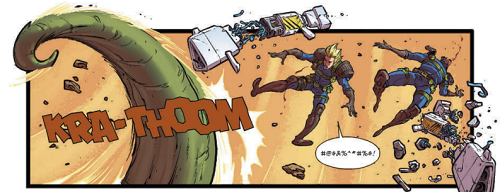Aubrey Sitterson is a writer, editor, and broadcaster, best known as the host of the online wrestling talk show STRAIGHT SHOOT. Aubrey’s a busy guy—he’s recently launched his new fantasy storytelling podcast SKALD, and he’s the writer of the back-up story found in today’s issue of Hulk. I had a chat with Aubrey about his podcasts, writing and editing comics, and the craft of storytelling.
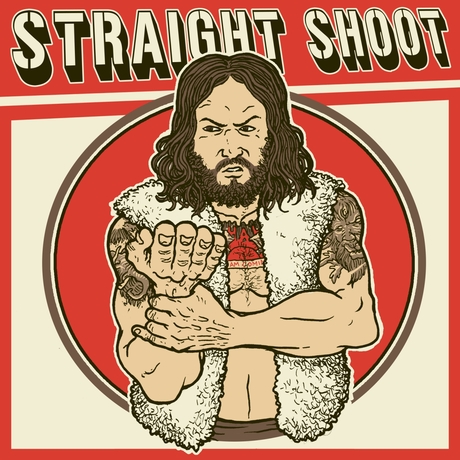
Podcast album art by Ramon Villalobos.
Dylan Roth: You’re best known online as the host of STRAIGHT SHOOT, “The World’s Smartest Rasslin’ Talk Show.” How did this show come about, and how long did it take to become the self-sustaining enterprise that it is now?
Aubrey Sitterson: I had been at WWE Games—handling interactive marketing, so all the social and digital stuff—at both THQ and 2K for about two years, but 2K was looking to move the operation up to San Francisco. I had just moved out to Los Angeles the year before though, and my wife had just moved out that very same year. That, combined with the WAY higher cost of living in the Bay Area and the fact that I wasn’t sure if I wanted to go all-in with video game marketing…I started looking around for other options. Truthfully, my first instinct was to go the writing route. I used to write about wrestling, both at WWE.com and freelance for several different outlets, and I wanted to get back to that, talking about the art form in a detailed, in-depth manner. Trouble is—as I’m sure you’re well aware—writing on the internet is worth practically nothing because there are so many people willing to do it for free or for pennies.
I also knew that being the 8 millionth unaffiliated wrestling blog on the internet wasn’t really a winning proposition either. That said, I did have kind of a foothold on the wrestling internet due to my work at WWE Games, particularly on Twitter and YouTube, so going the video route was an obvious choice.
As for becoming self-sustaining…it depends on what you mean by that. I started being able to cover my raw costs—things like web and podcast hosting, the equipment I purchased, WWE Network subscription, etc. sometime last year. But that’s barely scratching the surface of the true cost of doing the show, as it doesn’t take into account the massive amounts of time involved in not only watching programming, booking guests, writing run of shows and hosting the show itself, but also all the the promotional stuff to make sure that people actually SEE the show.
I’ve been really fortunate that the show has such generous viewers, willing to donate on Patreon, but it’s still a work in progress, as they represent a very, very small percentage of the show’s overall audience.
You’ve worked for some of the biggest companies in entertainment—editing at Marvel and Image, marketing at 2K and WWE, plus freelance writing everywhere from DC to Marvel to IFC.com. I imagine you’ve benefited a lot from all that experience.
I like to think so!
All of the different work you’ve done all comes back to entertainment and storytelling, which is a word I know you’re all about since the launch of your fantasy storytelling podcast, SKALD. You’ve promoted SKALD as “Conan the Barbarian as told to you by The Ultimate Warrior,” which is pretty pitch-perfect description, I think. For our readers, what exactly is SKALD?
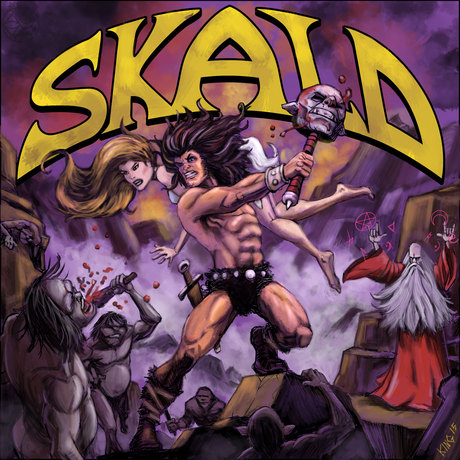
Podcast album art by Tommy Smith
First off: Thanks! Conan and Ultimate Warrior are two of my favorite things, so the fact that you think the comparison is apt means a lot.
SKALD is an ongoing sword and sorcery story, which I write a chapter of each week, with an eye toward reading it on a podcast. I take pains to tell folks that it’s NOT an audiobook, as those are simply prose stories that people read—stories that were meant to be read silently from a book. SKALD is written specifically to be read aloud, a kind of reinvigoration of oral storytelling for people to enjoy on their commute.
Before I even wrote the first page, one of the things I did to prepare was to sit down and make two lists. Basically the pros and cons of this very specific medium—which I think is a separate one from both audiobooks and even radio serials. I made a big list of stuff that the medium can do well, and things that separate it from other mediums, but also a list of the things that it’s not quite as adept at. I reference those lists frequently while writing each episode, trying to make sure that I use the medium to the best of its abilities.
This is a pet peeve of mine: people who write comics like they’re TV shows, or write TV like it’s a movie, or who plot out wrestling like it’s a comic book. These are all unique media with their own strengths and weaknesses. It’s baffling to me that people would try to ape other media instead of maximizing the potential of the one they’re working in.
That certainly sounds like a lesson learned while working as a comics editor.
Yeah for sure, at least partially. It’s a lesson that I learn over and over again. It’s an issue in video games too. Think of how many video games get promoted and marketed as “cinematic” or have their stories touted as being at the level of a prestige television show.
So yeah, SKALD is kind of a big heady brew of a lot of things I love: sword and sorcery (specifically Howard stuff and Elric), serialized storytelling, trippy, psychedelic violence and weirdness, character-based fight scenes, and more. I also like to think that despite there not being a bit of music in it (the only noises are what come out of my mouth), it’s pretty metal in terms of overall aesthetic.
Speaking of trippy, psychedelic violence and weirdness, you’ve got a backup story in today’s issue of Hulk that fits that description pretty well.
I do! Another thing I’m super excited about. Ever since leaving Marvel, it’s been one of my goals to break BACK in as a writer. Hell, since even before I edited there, that was my long-term goal. So to have a story not just in any Marvel comic, but in the comic housing perhaps the finest superhero of all, The Hulk…that’s amazing.
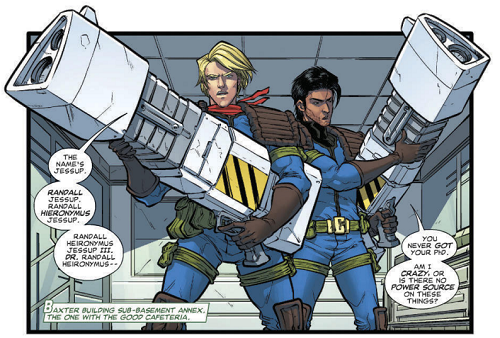
From today’s Hulk #16. Written by Aubrey Sitterson, with art by Rhoald Marcellius.
This isn’t the first time you’ve written something for Marvel, but it is your first time on such a high-profile book. What’s it like being on the other side of the desk, so to speak?
Honestly? Great. I’m really proud of my work as an editor. I worked on high profile stuff like Civil War, New Avengers, and Wolverine. Was the editor on books I loved like Blade, Ghost Rider, and The Irredeemable Ant-Man. And even though I left before it came out, I got the ball rolling on the Strange Tales anthology. I couldn’t be more proud of all of that. But truthfully, my goal was always to write the books, not edit them.
Editors are a crucial part of comic book production—in ways that the vast, vast majority of the audience doesn’t even begin to understand—but because I wanted to very badly to be writing the books, I think it hindered my development as an editor.
So now, to actually be writing the stuff…it’s amazing. And what’s more, I like to think that my time as an editor has actually made me a far better writer that I would have been otherwise, and it’s definitely made me an easier writer to work with.
Comic book editors are crucial, but they never get the love, respect, or understanding they deserve. Having been in that sometimes unenviable position, I tend to have a good idea of what editors are struggling with internally, and also recognize that even though the thing I’m working on is the most important thing in the world to me…editors are generally juggling a bunch of different books.
But you got to put all of your energy into just these eight pages.
Exactly! And it was the way I love to work too. [Hulk Assistant Editor] Chris Robinson reached out to me with a very specific set of parameters, “We need X, Y & Z. We need it to be fun and funny, it has to have these characters and accomplish all these thing. In eight pages.”
Some folks might hear that and blanch, just because on the surface of it, it sounds kind of restrictive. But I actually love that kind of thing because I see it as a puzzle. There’s a way that all of these requirements fit together—it was my job to find it.
You talked earlier about taking full advantage of whatever medium you’re working on. What do you think comics do better than other forms of storytelling, and how did you make that work for you in your story?
What makes comics interesting is less what they have going for them, and more what they have working against them: No motion, no sound, dialogue is space, not time, etc. But despite all of that, there’s one massive formal thing that comics does better than any other medium, as well as one huge structural thing—and they both fit together really well.
The formal aspect is that comics gives you moments. Moments frozen in time that readers are forced to consume as actual moments. A film or television doesn’t have moments in the same way—it’s an infinite amount of moments all strung together into motion. Prose doesn’t have visual moments at all. Comics, however, gives you an average of five moments per page – things that the writer(s) and artist(s) get to choose deliberately for their audience.
The structural advantage of comics is that since everything is being drawn, you’re only limited by the imagination and skill of your writer(s) and artist(s). There are no special effects budgets to come in under, there are no concerns about casting additional extras. You can do absolutely anything.
Taking those two facts together, I think the way to get the purest, most platonic form of comics is pretty simple (to attempt at least): A big, visual, amazing moment in every single panel. And that’s something that I try very, very hard to do with all of my comics writing. All killer, no filler, daddy.
Your story in Hulk is broad zany comedy–you pack at least one joke into just about every panel. Is comedy where you’re most comfortable, or is that just what works best for these characters in this space?
I like comedy a lot, largely because it’s such a challenge, especially in comics, where so many writers just rely on verbal jokes to hit their humor quota. Without actors to deliver it, that stuff often falls flat, so you really need to think visually, and have an amazing artist (like Rhoald Marcellius on the Hulk back-up!) who is capable of hitting those beats.
That said, comedy isn’t the only thing I’m interested in. There’s absolutely nothing funny about SKALD—it’s a heavy, violent, almost mean-spirited, sword and sorcery story. Likewise, my graphic novel WORTH, which came out last year, is a pretty straight-forward dramatic story.
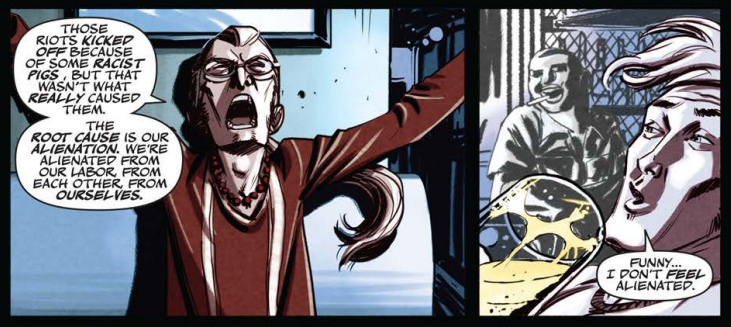
From the first chapter of Worth, art by Chris Moreno.
With the Hulk back-up, Chris & co came to me wanting something fun and funny to fit with the characters in the story, so that’s what I delivered. There’s this saying in wrestling, “Funny ain’t Money,” and unfortunately, I think it often applies to comics as well.
There’s this perception that if something is funny, it’s also slight and shallow (which first off, isn’t necessarily the case at all), and well therefore, not hit a wide audience.
I think that’s more a marketing concern than anything else though, as if you look at some of the biggest, most talented, most critically acclaimed comics writers going today, they are ALL capable of writing legit hilarious stuff, and frequently do, even in the midst of extremely serious stories.
Final question: you write comics, stories, and articles; you’re a broadcaster and storyteller; you’ve done marketing, you’ve worked in video games; you’re pretty much everywhere. Is there an endgame? A dream job? A particular comic you’re dying to write? Or do you prefer doing a little bit of everything?
I want to do all of it. I want to do all of it at such a high level that everyone has to stop what they’re doing and pay attention. Writing comics consistently and professionally – my own stories as well as established characters in other people’s sandboxes – has always been the endgame, but I love having an excuse to talk to wrestlers, screenwriters, comedians, musicians and more about professional wrestling, so I don’t plan on stopping STRAIGHT SHOOT any time soon. And as for SKALD…I have way too many overarching stories and characters already sketched out for it to NOT keep it going. It took me a while to learn it, but the best thing about STRAIGHT SHOOT and SKALD both is that they’re all me.
I have guests on STRAIGHT SHOOT, sure, but whether it comes out or not, is all on my shoulders each week—same deal with SKALD, which I write and perform solo. I think that there’s something really valuable in that, both in practical terms, so no one can flake out on you and ruin what you’ve built, but also in career terms, as you become intrinsically linked with what you create, and perhaps most importantly, in philosophical terms, as it’s incredibly satisfying to know that you brought something valuable into the world on your own, on your own terms.
Find info on all of Aubrey’s work at AubreySitterson.com.

